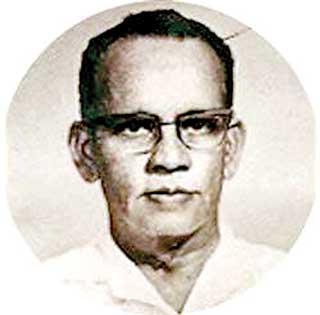10 Jun 2023 - {{hitsCtrl.values.hits}}
 The Celebrations are in process in the upcountry to mark 200 years (1823-2023) of Indian Origin so-called Plantation communities who arrived from Tamil Nadu, India in 1823
The Celebrations are in process in the upcountry to mark 200 years (1823-2023) of Indian Origin so-called Plantation communities who arrived from Tamil Nadu, India in 1823
The various grievances faced by the plantation communities were highlighted by various individual trade union leaders forming separate unions in different towns in the plantation sector, since the arrival of the community in Sri Lanka in 1823. It was a difficult task to solve some of the main grievances of the community. The initiative was taken by the great Leader Mahatma Gandhi and as a result, the late Indian Prime Minister Sri Jawaharlal Nehru visited Sri Lanka as his representative in 1937. He met the various individual leaders and urged them to form one large union to fight to resolve the grievances of the Indian-origin Tamils and as result the Ceylon Indian Congress (CIC) was formed. Desigar Ramanujam was one of the founding members of the CIC. The CIC later become as Ceylon Workers Congress, (CWC). Late Desigar Ramanujam’s 55th death anniversary fell on June 5, 2023.
Desigar Ramanujam was born in Ramanathapuram, South India on July 17, 1907. Upon completing his higher studies, he commenced a career in journalism. In the late 1920s Ramanujam, by then an accomplished writer, came to Sri Lanka and joined the editorial staff of a Tamil Newspaper Desa Bakthan. He also served as a correspondent for the Tamil daily Virakesari.
In 1943 he joined the teaching staff at Dharmaraja Collage, Kandy. Due to his fluency in English and Tamil, he was called upon by the Courts in Kandy to assist them in translating evidence from Tamil to English. During this period, noticing difficulties encountered by the poor Tamil workers, particularly those working in the Kandy Municipal Council, he went on to form an Association under the name Bose Sangam. These efforts were to safeguard the rights of Indian workers who lived in Mahaiyawa and Asgiriya.
Ramanujam was elected to the Kandy Municipal Council in 1943. He represented the Asgiriya ward and in 1946 became the first person of Indian Origin to be elected as the Deputy Mayor of Kandy. During this period, he was credited with providing pipe-borne water to the Asgiriya Maha Viharaya of Asgiriya Chapter. He had the blessing of the Venerable Mahanayaka Thera of the Asgiriya Chapter who urged the residents of Asgiriya Ward to support Ramanujam, who served the ward for 13 successive years.
Ramanujam was elected at the first Parliamentary Elections held between 23 August 1947 and September 1947. He contested as an independent candidate in the Aluthnuwara Electorate (presently Mahiyangana) securing 46.6% of the total vote; 1,437 votes ahead of his nearest rival. He defeated three candidates from the majority community. He thus became one of the seven CIC members elected to parliament in 1947.
Ramanujam worked tirelessly for the rights of the plantation worker as the joint Secretary of the Ceylon Workers Congress. He represented Sri Lanka as the workers’ delegate at several Annual meetings of the International Labour Organization (ILO). His contributions at these sessions were well appreciated.
In 1961 Prime Minister Sirimavo Bandaranaike offered Ramanujam an MP seat in Parliament because of the close friendship he had with the late SWRD Bandaranaike and with the Prime Minister. But he declined it in favour of Ceylon Workers Congress President Savumyamurthi Thondaman; much to the disappointment of the Premier.
The Prime Minister wasn’t happy, but it took a lot of convincing by Ramanujam to make Mrs Bandaranaike to offer the MP post to Thondaman.
In 1962, the International Confederation of Free Trade Unions (ICFTU) recognizing his contribution to the trade union movement and his achievements at the ILO meetings, invited him to join their organization, where he was given the task of organizing the sugar plantation workers in Mauritius. He was subsequently sent to Ethiopia to establish Trade Unions during the regime of Emperor Haisalasi.
In 1965 ICFTU appointed Ramanujam as the special representative in Singapore. His task was to persuade the National Trade Union Congress of Singapore to amend its constitution to become an internationally accepted Trade Union. He was then made the Regional Director in South East Asia.
In 1968 the ICFTU appointed Ramanujam as the Director of the Asian Region (Where he had to be based in India). However, he died unexpectedly on June 04, 1968 before he could take up the posting. Thus, the international trade union movement lost a simple human being who served the cause of the workers in Sri Lanka and internationally.
It is pertinent to note that Dr. Prathap Ramanujam son of Desigar Ramanujam the only surviving person in the next generation of any of the founding members has been recently appointed as a Civil Society independent member of the Constitutional Council in recognition of his non-partisan service to the country as a senior public servant particularly to the plantation sector when he was appointed as the first Secretary of the Ministry of Estate Infrastructure when it was created for the benefit of the plantation workers.
S.P.ANTHONYMUTHU.JP-UM PRESIDENT,
SAVUMIA YOUTH FOUNDATION
10 Jan 2025 27 minute ago
10 Jan 2025 32 minute ago
10 Jan 2025 2 hours ago
10 Jan 2025 2 hours ago
10 Jan 2025 2 hours ago